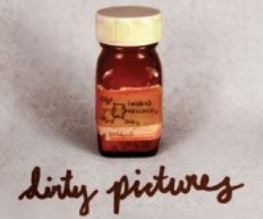Dirty Pictures

“If we can’t make love on a drug, then there’s something not quite right…”
Welcome to Dirty Pictures, a documentary which manages to turn the recreational drugs industry into something sweet and innocuous. We open with a little old married couple, chit-chatting about their lives. If you can drag your attention away from Shulgin’s inexplicable eyebrows long enough, you’ll realise that the pair aren’t telling you about their latest game of bridge; they’re filling you in on their favourite drugs. As you do. You have to forgive them for sounding obsessed, as this IS Shulgin’s life’s work. And, of course, it is the glue that holds their relationship together.

The film feels like a drug-trip itself, as Sauret shies away from the chronological and opts instead for a disorientated mosaic of clips. One moment you’ll be enjoying an interview with Shulgin, the next you’re at a rave, then (why?) you’re staring at a cloud, before launching back into the interview process as if nothing happened. There’s a lot of close-ups on sinister looking cacti. It boggles the mind.
In the process, we learn that Shulgin dropped out of Harvard and worked for Dow Chemical before a quest to create amazing psychedelic drugs. His wife, Ann, made her living through testing out how sex works on these drugs and writing about them. Mmm, sexy drug use. Together the pair have shot to fame, claiming a folk hero status amongst drug users everywhere.

The entire process is utterly disarming; I went in with an image of a man bent out of control, sitting in his makeshift lab and plotting the demise of humankind through psychedelic drugs. Instead, we get Sasha, who embodies the ultimate Grandfather stereotype; socks and sandals, mad facial hair and a strong desire to show you around his garden. Except the cactus he’s showing you isn’t just an interesting piece of fauna; it’s his main source for funky psychoactive drugs.
Thanks to this sympathetic portrayal, Shulgin comes across as… well, rather sweet. He mentions on numerous occasions that he would have preferred it if MDMA had taken on the street name Empathy rather than Ecstasy. It’s the “love drug”, after all. It’s for this reason that he takes a step back from the modern drug scene, angry with the fact that any old party drug is now given the same street name as his own creation.

We don’t stick to Shulgin like a limpet; instead, we dip from his makeshift laboratory and into legal psychoactive drug studies; there’s a surprising amount of academic activity involving psychedelic substances ongoing at universities (and no, that isn’t just the students dragging on a joint). Sadly, these stories are far less gripping than that of Shulgin. It might have been better had we focused more on his earlier life and got a more in-depth account of his views on the world of hedonistic drug use. What impact does he feel his work has had on mankind? We have no idea. The right questions haven’t been asked, as too much ground has been covered.
We end, strangely, on a shot of the Great Pyramids. Perhaps this signifies the fact that psychedelic drugs could help us solve the deepest mysteries of mankind? Then again, maybe not. It could just be a profound ending tagged onto the end of a very strange documentary…

Recent Comments